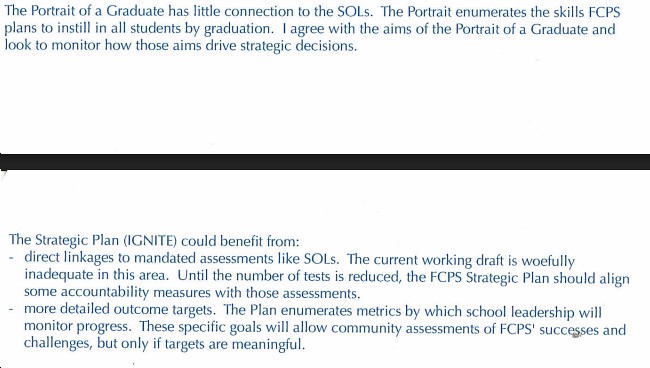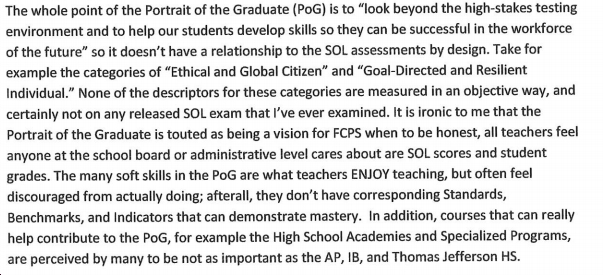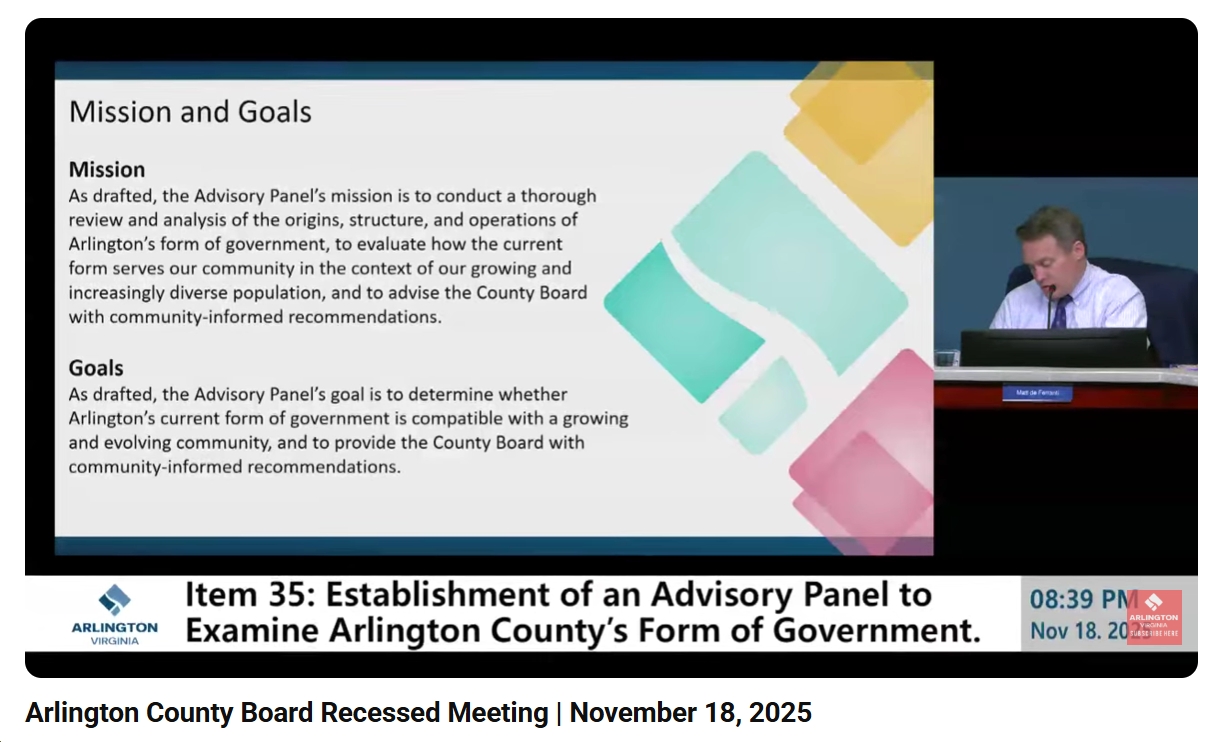The following are responses to the Fairfax County Democratic Committee (FCDC)’s questionnaire from the eight candidates for the Fairfax County Public School (FCPS) Board’s vacant, at-large seat. I’ll post the responses in random order. The candidates are, in alphabetical order: George Becerra, Marianna Du Bosq, Carolyn Hendler, Shaista Keating, Stacia Keel, Karen Keys-Gamarra, Michele Menapace and Abrar Omeish. Here are their responses to question #3 (“What is your view of the Portrait of a Graduate and its relationship to Standards of Learning (SOL) assessments?”) of the eight-question FCDC Q & A. I’ll post the other Qs & As in separate posts. Note that FCDC will hold its meeting to endorse a candidate for this position on Friday, June 23rd, 7pm at the Fairfax County Government Center.
Michele Menapace

George Becerra
Dr. Garza’s vision of the Portrait of a Graduate emphasizes multiple pathways to graduation. Our state Board of Education has also embraced the need to provide these pathways. By reducing our reliance on standardized tests, we increase the emphasis on 21st century skills and the areas of the Portrait that matter most to student success: Creative and Critical Thinker, Communicator, Collaborator, Ethical and Global Citizen, and Goal Directed and Resilient Individual. Fairfax employers are interested in hiring graduates who are prepared for the workforce. George believes that this school board should be at the forefront of the proposed changes to graduation requirements. He fully supports redesign and elimination of many of our current testing regimens.
Marianna Du Bosq
As a mother striving to raise two global citizens, I was pleased to see FCPS, working with community members, identify a series of skills that will help our students thrive. The Portrait of a Graduate helps to balance the emphasis on testing to empower our students become more well-rounded individuals. The criticism around the implementation of SOL has often been that educators and schools feel pressured to teach to the test. The nature of SOL assessments could easily result in an overwhelming focus on SOL related content while overlooking much of the overall learning that is necessary in schools. The Portrait of a Graduate helps to bridge that gap. That being said, FCPS needs to work harder to ensure that all students in the county are achieving the objectives laid out in its portrait. The reality is that is not the case for a segment of our community’s students especially our African American, Latinx, and economically disadvantaged students. The current framework is student-focused and it overlooks how our public school system should look and what it must do to ensure that all students have access to an excellent education regardless of their ethnicity, zip code and race.
Karen Keys-Gamarra
The Portrait of a Graduate is a vision of five traits we want to see in every FCPS student. It makes no mention of the Standards of Learning (SOL) tests, which are the legacy of discredited education policy from the era of Governors Allen and Gilmore. Under Karen Garza, FCPS played an important role – in collaboration with the State Superintendent, the State Board of Education, the McAuliffe administration, and the General Assembly – to redefine high school graduation requirements and reduce the number of SOL tests. That effort is not finished, and I will work with School Board colleagues and the new Superintendent, Dr. Scott Braband, to continue to assert FCPS influence on state education policy.
Shaista Keating
SOL assessments provide only the basic outlines of what today’s high school graduates need to become successful. If we only focus on teaching the basics, we will fail our children. I worked as a consultant for FCPS to deliver the strategic analysis on 21st Century Learning, paving the way to implement the Portrait of a Graduate. Through that work—which included the collaborative efforts of over 200 stakeholders in our schools—I am intimately familiar with how far we must reach beyond the SOLs. Regardless of their goals, our children will only succeed if their education helps them become resilient, engage in critical thinking, work collaboratively, and understand how to innovate. These concepts are not for the elite; they form the building blocks of today’s jobs at every level. That is why I took my work beyond FCPS, to Richmond. In partnership with 75 parent, teacher, student and business advocates, I helped propel FCPS’ work on 21st Century Learning to the state level. As a result of Superintendent Garza’s leadership, we convinced the Commonwealth to build an SOL Innovations umbrella. We have implemented more critical thinking, and decreased the overall number of tests so we can move beyond the basics.
Abrar Omeish
–Any effective policy would keep in mind the mistakes of No Child Left Behind when considering the role of standardized testing; a balance is needed between student accountability and “soft skill” development
–The need to adhere to SOL assessments and FCPS goals through the Portrait of a Graduate are not necessarily mutually exclusive; skill goals in the portrait can be the means for meeting SOL benchmarks (required knowledge can be taught, practiced and engaged with in creative ways)
–Skills outlined in the portrait are absolutely essential; more detailed plans related to
implementation and curriculum guides are to be developed for further student empowerment
–SOL testing, while not a fair representation of student ability or success potential, introduce students to the reality of standardized assessments that are not avoidable for future success (e.g. the SAT, ACT, AP/IB tests, LSAT/MCAT/GRE)
–Corporate partnerships can help facilitate projects to implement the portrait of the graduate and the strategic plan that remain goals (e.g. Girl Scout “Make the Connection” program)
Carolyn Hendler
The Portrait of a Graduate sets forth the skills every FCPS student should have when they graduate. The stated goal is for students to be effective communicators, collaborators, ethical and global citizens, creative and critical thinkers, goal directed and resilient individuals. Measuring student success in this way should lessen the focus on standardized tests. I fully support this concept and moving away from so heavily relying on standardized test scores and classes teaching to the test.
Stacia Keel



















